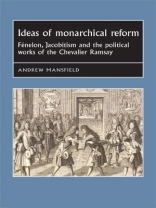This book examines the political works of Andrew Michael Ramsay (1683–1743) within the context of early eighteenth-century British and French political thought. In the first monograph on Ramsay in English for over sixty years, the author uses Ramsay to engage in a broader evaluation of the political theory in the two countries and the exchange between them. At the beginning of the eighteenth century, Britain and France were on divergent political paths. Yet in the first three decades of that century, the growing impetus of mixed government in Britain influenced the political theory of its long-standing enemy. Shaped by experiences and ideologies of the seventeenth century, thinkers in both states exhibited a desire to produce great change by integrating past wisdom with modern knowledge. A Scottish Jacobite émigré living in Paris, Ramsay employed a synthesis of British and French principles to promote a Stuart restoration to the British throne that would place Britain at the centre of a co-operative Europe. Mansfield reveals that Ramsay was an important intellectual conduit for the two countries, whose contribution to the history of political thought has been greatly under appreciated. Including extensive analysis of the period between the 1660s and 1730s in Britain and France, this book will be of interest to scholars and students with an interest in political, religious, intellectual, and cultural history, as well as the early Enlightenment.
Tabla de materias
Introduction
1. Division and unity I: revolution and settlement
2. Division and unity II: fear and corruption
3. Liberty and the public good: the political principles of Archbishop Fénelon
4. The reign of Louis XIV: absolute monarchy
5. Confronting the legacy of Louis XIV: government reform and Britain
6. Ramsay and his associations
7. A mythical conversation: an Essay and a Vie
8. A mythical education: Ramsay’s Cyrus and Plan
Conclusion
Select bibliography
Index
Sobre el autor
Andrew Mansfield is a lecturer at Goldsmiths, University of London, and a member of the Sussex Centre for Intellectual History












